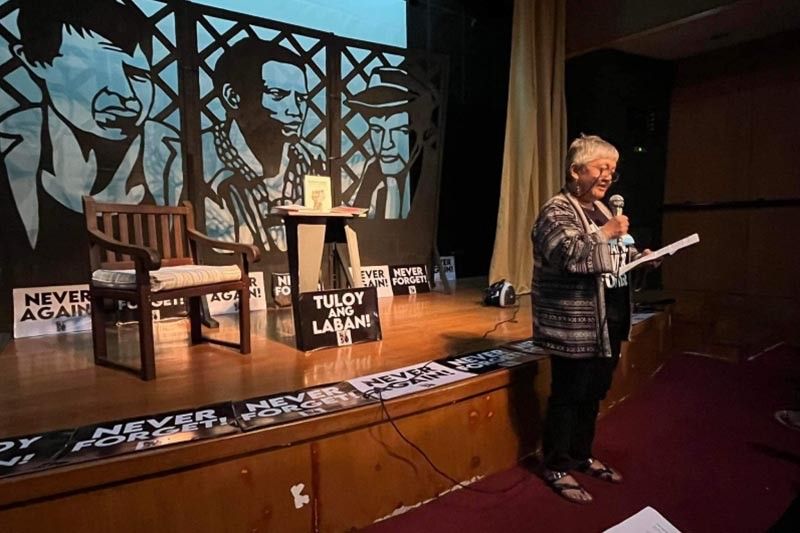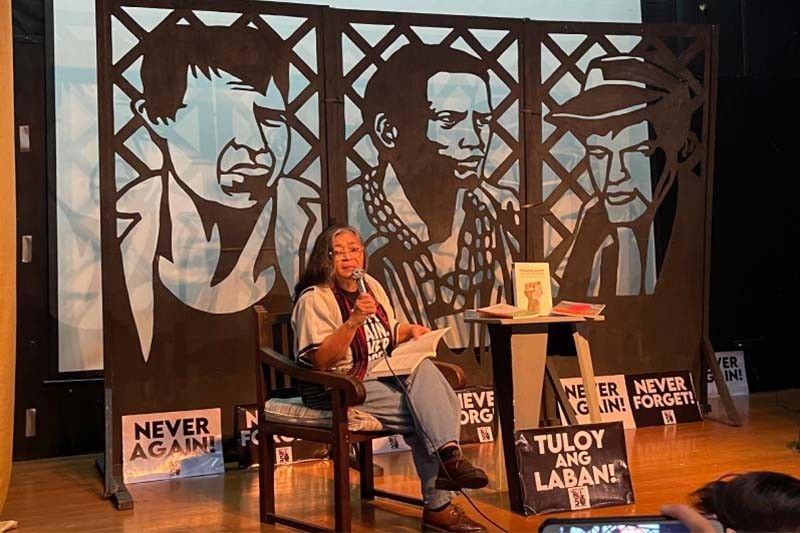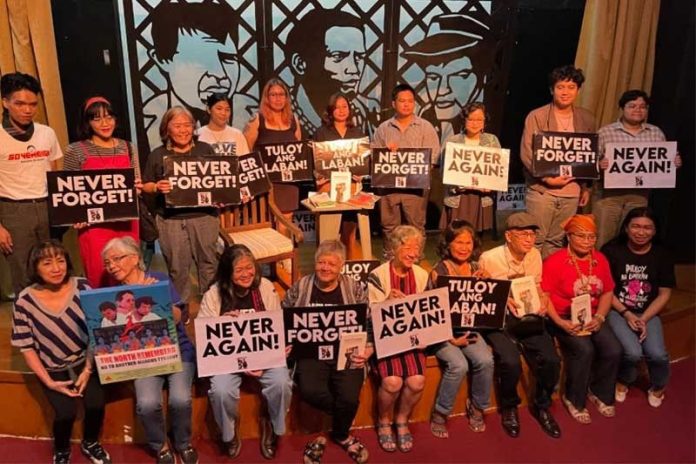Jap Tobias – Philstar.com
February 24, 2023
MANILA, Philippines — They were young, idealistic students in various schools and universities in Northern Luzon back then who spent their time writing, organizing and joining demonstrations against Marcos Sr.’s dictatorial rule.
Over three decades since the Marcos dictatorship was toppled, these activists from Ilocos, Pangasinan, Cagayan Valley and Cordillera have come together again, mustering the strength and courage to revisit their grim memories of Martial Law and immortalize them into a book.
In hopes of keeping the national memory of Martial Law from fading, victims-survivors from Northern Luzon on February 23 launched a new book aptly entitled “Panaglagip: The North Remembers — Martial law Stories of Struggle and Survival” at the Bantayog ng mga Bayani.
The book is an anthology of 28 eyewitness accounts, articles, poems and artworks of activists and ordinary people — testimonies of their experiences and the resistance in Northern Luzon during the dictatorship they offer to a new generation of readers.
Joanna Cariño, a Martial law political prisoner and one of the editors of “Panaglagip,” said the stories featured in the book are from ordinary people in the North who “dared to struggle against tyrants” and have contributed to the “critical mass” that ousted the late strongman.
The Ilocano word “panaglagip,” which means “remembering” in English, attempts to capture not only the process authors have done throughout the years in writing their pieces but also what they hope to inspire among readers.
“In recounting these stories, we honor those who went before us, who stood beside us, who defended us, and who followed in our footsteps as human rights defenders in Northern Luzon,” she wrote in the book’s introduction.
During the 2022 elections campaign, “Walang Solid North” had been the battle cry of the those who dared refute the narrative that the Marcoses have solid ground among the peoples of Ilocos, Cordillera and Cagayan Valley.
“Panaglagip” amplifies this counter-narrative and proves that as early as 1972, cracks were already emerging in what was claimed to be a solid base of the Marcoses.
Through the words of 22 writers, the book vividly paints a picture of what life was for activists and detractors of the Marcos regime in the North.
The stories told in the book include the experiences of being a human rights worker in the 80s, the fight of over 30,000 farmers in Cagayan Valley against a Marcos’ crony’ landlord, and the resistance of Cordillera’s Indigenous Peoples against the Chico Dam.
The book also shares the story of a community worker who lived through the feeling of deprivation after being separated from her loved ones due to arrests. Also included are stories about finding romantic love amid intensifying struggle, and stories of solidarity among community journalists in Pangasinan during the detainment of a fellow writer.
All these narratives told in the book, according to its editor Luchie Maranan, are a weapon against the “myth” of “Solid North.”
“Ito ang bala natin, kasi ito ang magpapatunay ng mga tunay na nangyari, mula sa kuwento ng mga totong tao,” she told Philstar.com. “Ang mga narratives na ‘yan ay historical accounts of places, dates, of people who were involved in the violation of Human Rights of people who resisted the dicatorship.”
Notwithstanding the trauma and the lack of apology from the Marcoses, the editors and writers still felt they had to continue telling these stories and sharing their experiences, especially for those blinded by disinformation.
“Kapag nag-book burning na, parang nasunog na talaga ang kasaysayan. But if you will be part of the movement to defend the truth, get a copy and keep it with your life,” Maranan said. “Guard the truth and guard your life.”
Northern Luzon during Marcos years
According to Maranan and Cariño, the newly-published book is an essential contribution of Martial Law survivors from the North to the ongoing truth campaign against disinformation and image rehabilitation of the Marcoses.

Photo courtesy of CARMMA
“We feel that direct survivors are among those who are telling the truth. They can’t say that these are lies because these are direct, first-hand testimonies,” said Cariño.
The “Solid North” narrative has often purported positive experience and better life among Ilocanos under the Marcos Sr. administration because of his ties with the North.
However, “Panaglagip” belies this. As said in the testimonies in the book, the Martial Law experience in Northern Luzon was characterized by “warlordism, crony capitalism, and development aggression.” This was manifested in the rivalry of political families in Ilocos Sur, Marcos cronies’ acquisition of a hacienda in Isabela and communal forests in Abra, as well as the “Ilocanization” of the Philippine military.
Like the newly-launched book, a study published in 2020 by University of the Philippines Los Banos Assistant Professor Reidan M. Pawilen also said the idea the Ilocanos had it better during Martial Law was far from true.
According to Pawilen, there are three major themes in the North’s resistance during Marcos Sr.’s year: First is the struggle of peasant movements, the church and IP groups in the North; second is the growth of the Ilocano student movement; and last the violence that transpired during the Snap elections and Marcos’ first-time loss in five northern provinces due to a growing sense of discontent among Ilocanos.
Mentioned in the paper are some of the several human rights violations recorded in the North during Martial Law, including:
- eight cases of illegal detention, extrajudicial killings, intimidation and torture in Cagayan Valley in 1983
- killing of priests from Ilocos Sur, Zacharias Agatep and Alfredo Cesar Jr.
- burning of a village in Abra in 1983, which killed a pregnant woman
- arrest of 127 Tinggians from Malibcong, Bucloc, and Lacub, Abra.
- assasination of IP leader Macli-ing Dulag in Kalinga
‘Fight isn’t over’

In her piece entitled “Second Wind,” activist and Palanca-winning writer Maranan opened her recollection of her Martial Law years with the concept of “political deja vu” — the feeling of familiarity been past and present socio-political traumatic events.
Asked how it has been for her to revisit traumatic memories in editing this book while the Marcoses are back in power, Maranan surprisingly said that the experience has been a beautiful process.
“While you are dealing again with the pain, the struggles and the nightmares, nabubuhayan ka uli ng loob (you gain strength again),” she told Philstar.com.
“‘Yung iba, they went through the harshest times and would choose to forget. Pero ito, naging challenge pa — na it has happened, it is happening again, and it is continuing — so the fight isn’t over,” she added.
“Panaglagip,” while all about remembering the events 50 years ago, also serves as a letter to inspire activists, writers, and students — then and today — to keep remembering and speaking the truth.
As Maranan optimistically put in her write-up: “While we remember what we had been capable of, we must muster renewed political energy, in stride with the hopeful new generation of activists, and continue to be inspired by those had gone ahead of us. In remembering, we do not renounce the will to pursue the struggle we began fifty years ago through ways that steeled and tempered us to stand up to another dictatorship and tyranny.”



